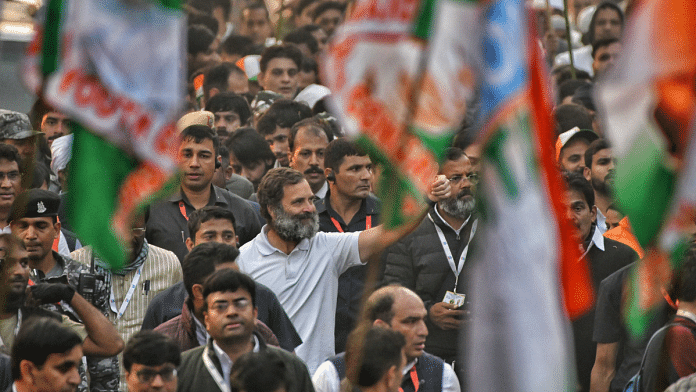A K Antony’s comment that the Congress must mobilise majority Hindu community to defeat the BJP in the 2024 Lok Sabha election and that minorities are “not enough in this fight” underlines a serious crisis of ideas. Although Antony remained apprehensive about the term ‘soft Hindutva,’ one finds an uncritical acceptance of BJP’s politics of Hindu victimhood in his speech.
Antony’s advice to have a visibly ‘Hindu gesture’ highlights the Congress’ unease to deal with non-Hindu communities, especially Muslims, as legitimate political stakeholders. At the same time, these remarks destabilise the intellectual claim made by senior Congress leaders that Rahul Gandhi-led Bharat Jodo Yatra will produce an alternative vision of politics.
Does it mean that the Congress has finally accepted the Hindutva criticism that it has always been involved in ‘Muslim appeasement’? Or does it mean that politics of Muslim appeasement has to be replaced by an equally effective politics of ‘Hindu appeasement’?
Antony’s statement is based on three misleading assumptions:
- There is a need to approach Hindu voters only as Hindus, simply to take care of their religious sentiments.
- A ‘pro-Muslim’ tag will naturally offend Hindus. Therefore, Congress should not be seen as a Muslimor minority-friendly party.
- Muslims should understand that Congress’ pro-Hindu approach is logically beneficial for them to defeat their natural enemy, the BJP.
These assumptions are accepted by virtually all non-BJP parties as hard-core political facts. It is believed that the BJP has successfully used these arguments to create and nurture its Hindutva constituency of voters.
But these widely believed assumptions are anything but ‘facts.’
Also read: Has Bharat Jodo Yatra lowered communal tempers or is it naive optimism? My take
BJP’s Hindu-ness, Congress’ pro-Muslim image
The Lokniti-CSDS surveys have shown that the BJP’s success in post-2014 India cannot entirely be reduced to ‘religious sentiments of Hindus.’ Of course, Hindutva-driven nationalism has been an important electoral agenda for the BJP. Yet, the party has never ignored other ideological considerations.
BJP has redefined the nature of welfarism in a significant manner to establish a link between pro-poor schemes and national pride. In other words, Hindu voters are not always approached as Hindus by the BJP establishment. Instead, Hindu-ness is defined in relation to everyday issues such as poverty and lack of development.
The claim that pro-Muslim image of the Congress would eventually upset Hindus is also incorrect. A recent study conducted by the Pew Research Centre ‘Religion in India: Tolerance and Segregation’ is relevant in this regard.
‘Respect for religious diversity’ is one of the most fascinating findings of this report. An overwhelming majority of Indians believe that India belongs to all religious groups. The respondents assert that showing respect to all Indian religions is a basic moral requirement to be identified as ‘truly Indian’. It simply means that Hindus and Muslims do not envisage themselves as enemies. It is actually the problem of the political class that adheres to communal identities and stereotypes in the electoral arena.
This brings us to the third assumption: Congress’ future success will help Muslims get rid of BJP. This is a tricky formulation. It is true that the BJP does not show any direct interest in Muslim voters. But, the party’s recent attempt to reach out to Pasmanda Muslims is a subtle strategy that played out in a delicate manner. Meanwhile, the BJP has effectively established that Muslims have always been given undue advantages by the secular parties to ignore Hindu interests.
No one can deny the fact that Congress appeased the Muslim elites to create an electoral equilibrium in the name of secularism. However, this ‘elite appeasement’ did not have any impact on the everyday life of poor and marginalised Muslims.
This is why the voting pattern of Muslims in India always remains highly diversified. They did not even hesitate to vote for the BJP. Evidently, Muslims do not participate in electoral politics merely to defeat BJP; on the contrary, they assert their identity as secular voters in the electoral arena without giving up their religious belief.
Also read: New confusion over national monuments comes from a fixation on ‘who destroyed what’
Subaltern Muslims and grassroots India
In my view, two aspects of contemporary Indian Muslim identity need to be acknowledged.
- Muslimness as an imagined discourse treats Muslims as a homogeneous community that may be pitted against an equally imagined homogenous Hindu community.
- Muslimness as a lived identity determines the everyday existence of Muslims in different contexts and transforms them into a highly heterogeneous religious group.
Our public discussions revolve around only one aspect of Muslimness. Political parties treat all Muslims as members of a closed homogeneous social group, either to protect them as a ‘religious minority’ or demonise them as an anti-Hindu force. This limitation is clearly reflected in A.K. Antony’s argument. He could not think of Muslims outside this given essentialist framework of minority and majority.
Meanwhile, Muslimness as a lived identity, on the other hand, is not an abstract formulation. It is constituted in real-life situations at the grassroots level where Muslims participate as citizens and voters. The beautiful pictures of Muslims from Bharat Jodo Yatra actually underline this substantive Muslimness.
Bharat Jodo Yatra is a good opportunity for the Congress to redefine its approach towards Muslims. If the party continues to adhere to the elitist imagination of Muslimness, it will not be possible for its leaders to go beyond A.K. Antony’s thesis.
However, if Muslimness as a lived experience is recognised as an intellectual resource, then a creative, secular, subaltern, inclusive and non-conflicting idea of India could eventually be produced.
After all, Bharat Jodo Yatra is all about the grassroots of India.
Hilal Ahmed is a scholar of political Islam and associate professor at the Centre for the Study of Developing Societies (CSDS), New Delhi. He tweets @Ahmed1Hilal. Views are personal.
(Edited by Ratan Priya)



